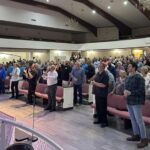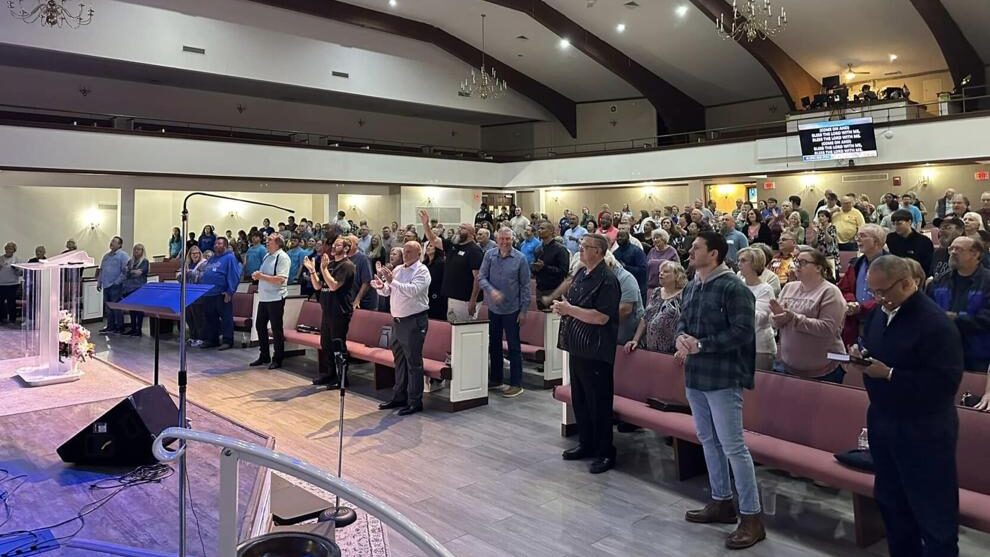Pastor Johnny asked the questions sincerely and with a heavy heart: “Is it just our church? Are we the only ones who have more than half of our people not wanting to return? Are we the only ones who can’t find staff members?”
His fellow pastor friends sat quietly, nodding in agreement, as Johnny described the frustration and discouragement he is experiencing.
I’m not sure if he was seeking suggestions from his peers or if he merely needed confirmation he wasn’t alone, but his willingness to express it was encouraging despite the downtrodden tone of his voice.
Stating it out loud and owning the situation provides the needed foundation to figure out the next step.
The other pastors assured him he wasn’t alone and the concern was not only statewide but nationwide.
They didn’t solve the situation that night, but they shared a moment of camaraderie and will likely be able to talk more freely about it going forward.
As I listened to the discussion, I thought of a comment I heard a few days prior, a comment from another Pastor Johnny — veteran Georgia pastor and North American Mission Board senior vice president Johnny Hunt.
Hunt said in an interview with our team, “If you’ll listen to people, they’ll tell you what’s important.”
It doesn’t mean people will always say or portray what’s weighing on their hearts, but if we will truly listen, then we’ll find it.
“Is it just our church?” indicates a plea for assurance that he isn’t alone, and the other pastors were sensitive enough to hear his heart and provide assurance.
“Are we the only ones … ?” might also be a way of asking for help.
My mind swirled through several scenarios wanting desperately to provide a suggestion about what to do, but I’m not sure any of us know exactly what to do at this point.
Latest stats
Even recent articles featuring experts discussing the stats and research reports stop short of sharing tips for how to adjust to this new church life situation.
Lifeway Research reports that as of September, 75% of churchgoers returned.
And while that percentage is much higher than our pastor friend shared with his peers recently, the question remains: What happened to the churchgoers who have not returned?
“The Ripple Effect: Congregations, COVID, and the Future of Church Life,” a fall 2021 study from Grey Matter Research and Infinity Concepts, suggests those who didn’t return might already have been among the least active group.
Infrequent churchgoers were more likely to stop attending in-person worship than those who regularly attended church before, according to Grey Matter.
Of those who attended church less than monthly before the pandemic, 25% chose to stop attending once the pandemic began, the Lifeway report explained in its review of the research.
Only 11% of those who attended church at least monthly prior to the pandemic made the decision to stop attending in-person services.
The same applied for Bible readership and small group attendance, according to Grey Matter.
Among those who read the Bible weekly, 10% decided to stop attending in-person services. For those who read the Bible less often, the percentage jumped to 19%. Similarly, 9% of those in a small group chose to stop, while 16% of those not in a small group made that decision.
Learning to relate
Still, we all know plenty of extremely dedicated believers who remain cautious about gathering in crowds because of health-related concerns, so the statistics certainly don’t tell the full story and shouldn’t cause us to judge or shame those who haven’t returned.
At the same time, it’s helpful to think through all the potential reasons and compare what’s happening at church with what’s happening in the workforce as well as all public activities.
It’s also important to make sure we are shepherding the congregation we have — both those who show up on Sunday and those who are connected from a distance — without spending energy worried about who isn’t participating. Do focus on those who disappeared by staying in touch with them as much as possible, keeping the welcome mat out and seeking to share Christ with all who don’t yet know Him. But avoid the temptation of coaxing those who have left back at the expense of caring well for those who are actively participating.
Going forward, we’ll likely need two approaches to church. In fact, those with strong homebound ministries already in place have the advantage.
And finding clear forms of consistent communication is an important step in keeping the entire congregation united. Click here for church communication tips and reach out to our team at The Baptist Paper to brainstorm ideas that fit your specific situation.








